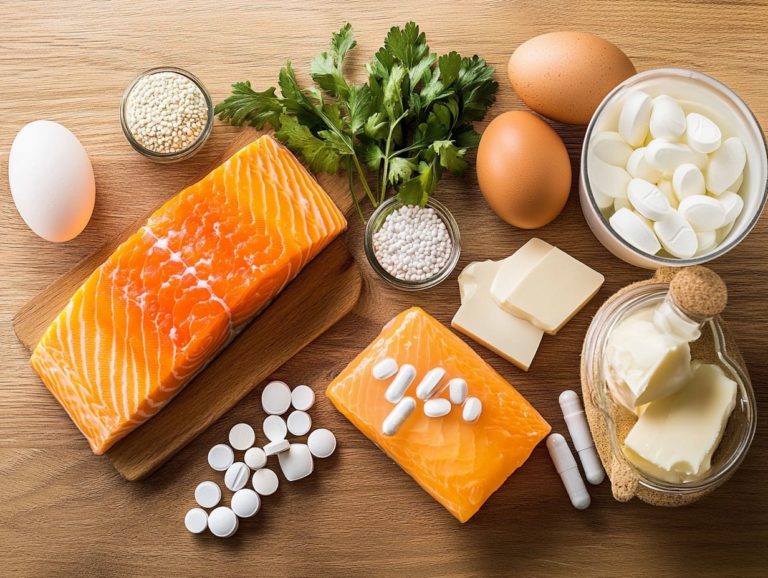The Importance of Hydration and Electrolytes
Hydration and electrolytes are crucial elements of overall health, yet they often remain overlooked.
This article explores the importance of hydration and electrolytes, emphasizing their essential roles in bodily functions and their significant impact on your well-being. We will look at the signs of dehydration and electrolyte imbalance, and provide practical strategies to help you stay adequately hydrated.
Whether you re an athlete striving for peak performance or simply aiming to enhance your daily health, understanding these concepts can empower you to maintain balance and vitality.
Contents
Key Takeaways:
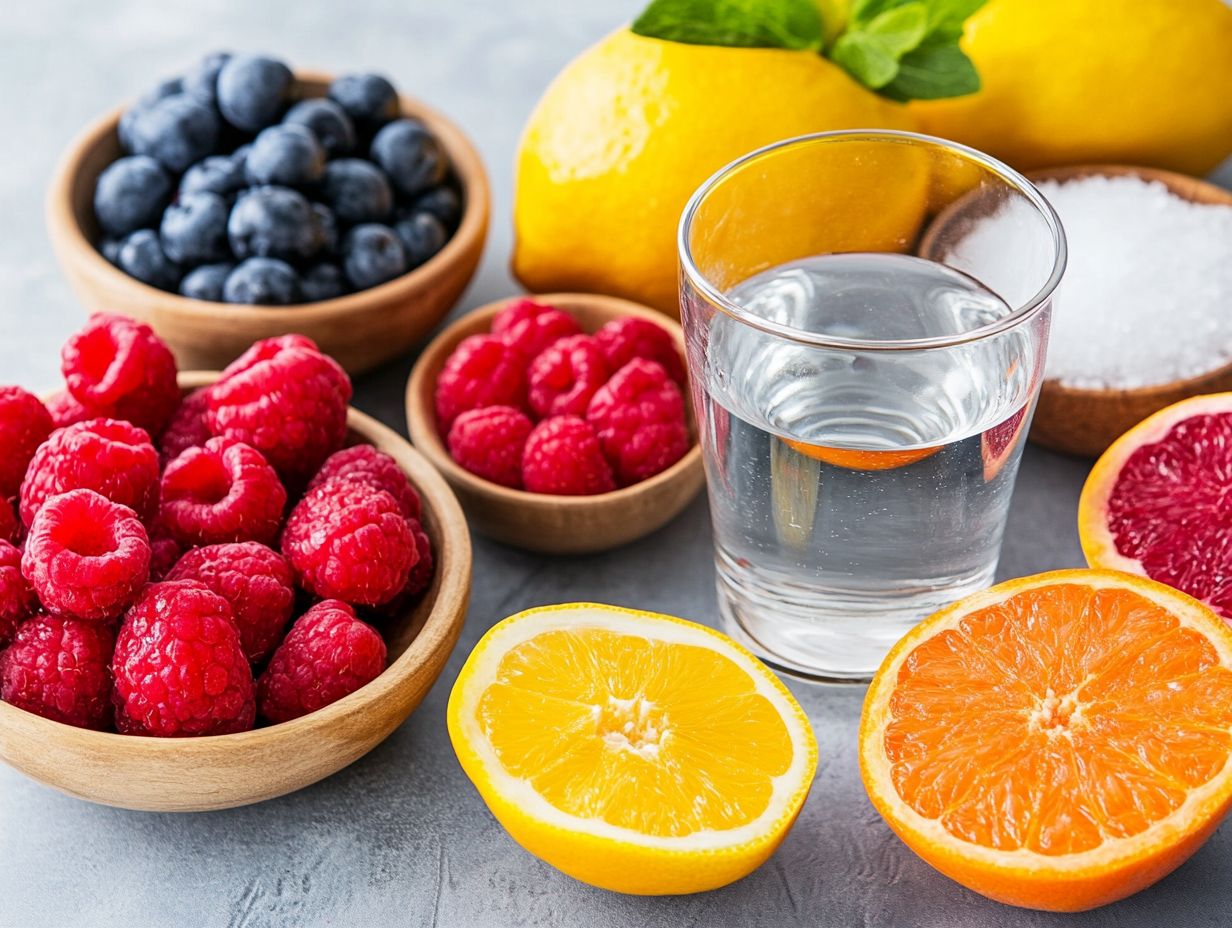
- Hydration and electrolytes are vital for maintaining overall health and bodily functions.
- Signs of dehydration and electrolyte imbalance should not be ignored and can be addressed through effective strategies.
- During physical activity, replacing electrolytes is essential to prevent fatigue and maintain optimal performance.
Understanding Hydration and Electrolytes
Understanding hydration and electrolytes is essential for maintaining your health. These elements help regulate body fluids and ensure mineral balance.
Electrolytes such as sodium, potassium, magnesium, calcium, chloride, and phosphate play a crucial role in muscle and nerve function and nutrient absorption.
Staying hydrated is vital for your overall well-being. It influences everything from energy levels to blood pressure control. Recognizing the symptoms of dehydration is crucial for your health.
What are Hydration and Electrolytes?
Hydration involves maintaining a precise balance of body fluids. Electrolytes are essential minerals that carry an electric charge and are crucial for many bodily functions.
Without proper hydration, your body’s systems may struggle to perform efficiently. Electrolytes such as sodium, potassium, calcium, and magnesium help regulate nerve function and muscle contractions.
Sodium controls blood pressure and volume, while potassium is vital for heart function and muscle contractions. Calcium supports bone health and facilitates communication between nerves and muscles.
When your hydration levels are optimal, these electrolytes work together to boost your physical performance and prevent issues like muscle cramps and fatigue.
The Role of Hydration and Electrolytes in the Body
Hydration and electrolytes significantly influence your mineral balance and overall health.
They contribute to optimal blood pressure control, efficient muscle function, and effective nerve function. Understanding how these elements interact is key for anyone looking to enhance their well-being.
This understanding is particularly important when considering the right intake of water and electrolyte-rich foods to support your health journey.
How They Affect Overall Health
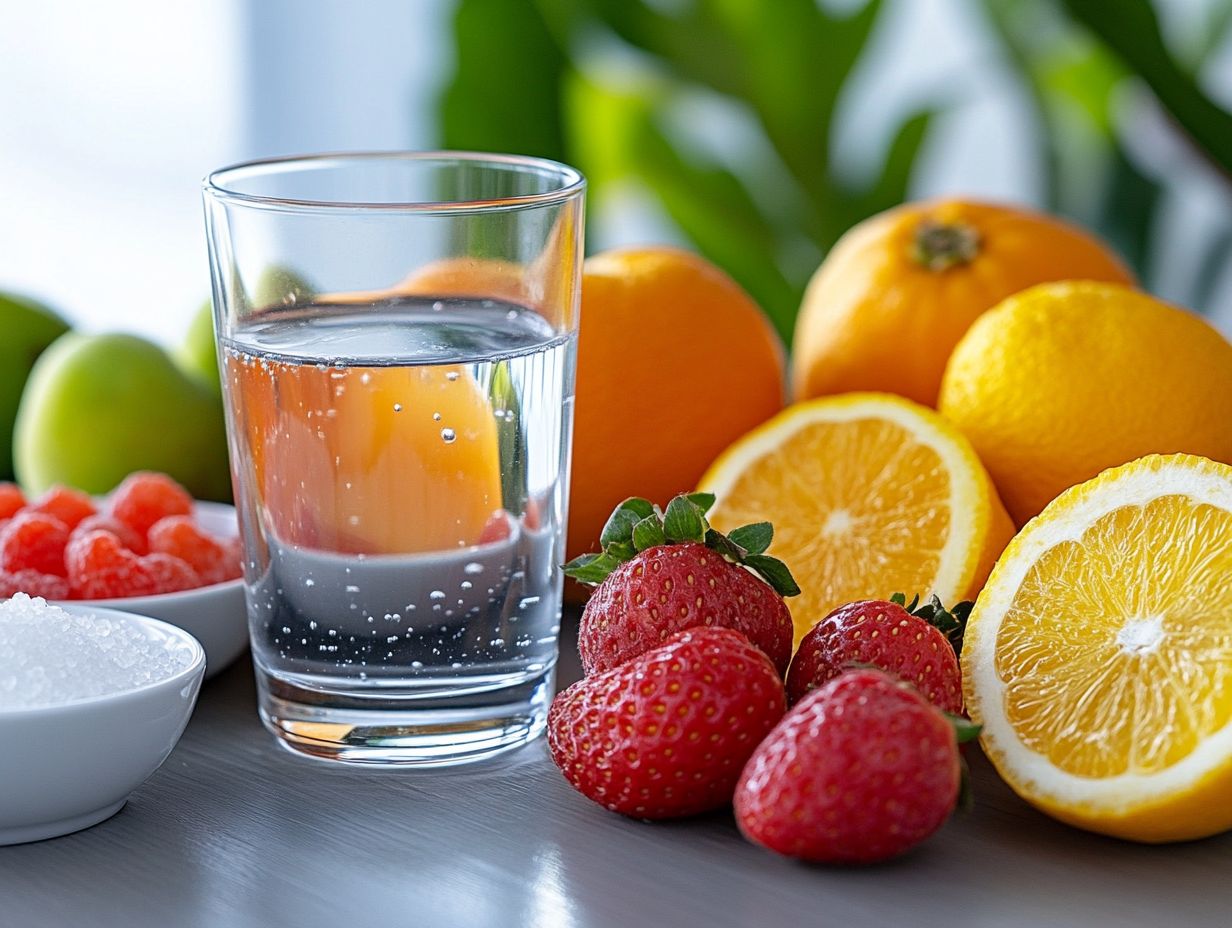
Hydration and electrolytes are essential for your health. They help maintain hydration status, regulate blood pressure, and facilitate nutrient absorption. When deficiencies occur, severe symptoms of dehydration may arise.
Maintaining optimal hydration is crucial for your body s functions. Even mild dehydration can impair cognitive performance and lead to fatigue. A study published in the Journal of Nutrition revealed that a 1-2% drop in hydration can negatively impact attention and memory.
Electrolytes like sodium and potassium are vital for muscle function and nerve signaling. A lack of them can result in cramps or irregular heartbeats, highlighting the delicate balance necessary for good health.
Health experts emphasize that adequate hydration boosts metabolism and supports digestion, which enhances overall energy levels and mood. Therefore, prioritizing hydration and maintaining a proper balance of electrolytes is essential for anyone aiming to optimize their health and wellness.
Take Action: Start tracking your hydration levels today! Incorporate electrolyte-rich foods into your diet and pay attention to your body s signals to maintain a healthy balance.
Signs of Dehydration and Electrolyte Imbalance
Recognizing the signs of dehydration and electrolyte imbalances is crucial for your overall health. These conditions can present themselves through various symptoms, including fatigue, dizziness, and confusion.
If you notice symptoms, see a health professional who may recommend an electrolyte panel to diagnose the issue accurately. Staying attuned to your body s signals can make all the difference in maintaining your well-being.
Identifying and Addressing Symptoms
Identifying and addressing symptoms of dehydration and electrolyte imbalances is crucial. Early recognition can help prompt treatment and prevent serious health complications.
You may notice common indicators such as persistent thirst, a dry mouth, fatigue, dizziness, and headaches. In more severe situations, confusion or heart palpitations might arise, signaling an urgent need for attention.
If you suspect you’re experiencing these symptoms, take a moment to reflect on your lifestyle choices. Inadequate fluid intake or excessive sweating during exercise could be playing a role.
You can boost hydration by adding more hydrating fruits to your diet and incorporating electrolyte replacement solutions to restore balance. In more extreme cases, seeking professional medical advice is essential to ensure safe management and appropriate care.
Ways to Stay Hydrated and Maintain Electrolyte Balance
Maintaining proper hydration and electrolyte balance requires a multifaceted approach. You’ll want to incorporate electrolyte drinks into your routine, understand the hydration index of various foods, and ensure you’re getting adequate dietary sources of important minerals.
Together, these strategies can significantly enhance your overall health and support optimal fluid retention.
Simple Tips for Staying Hydrated
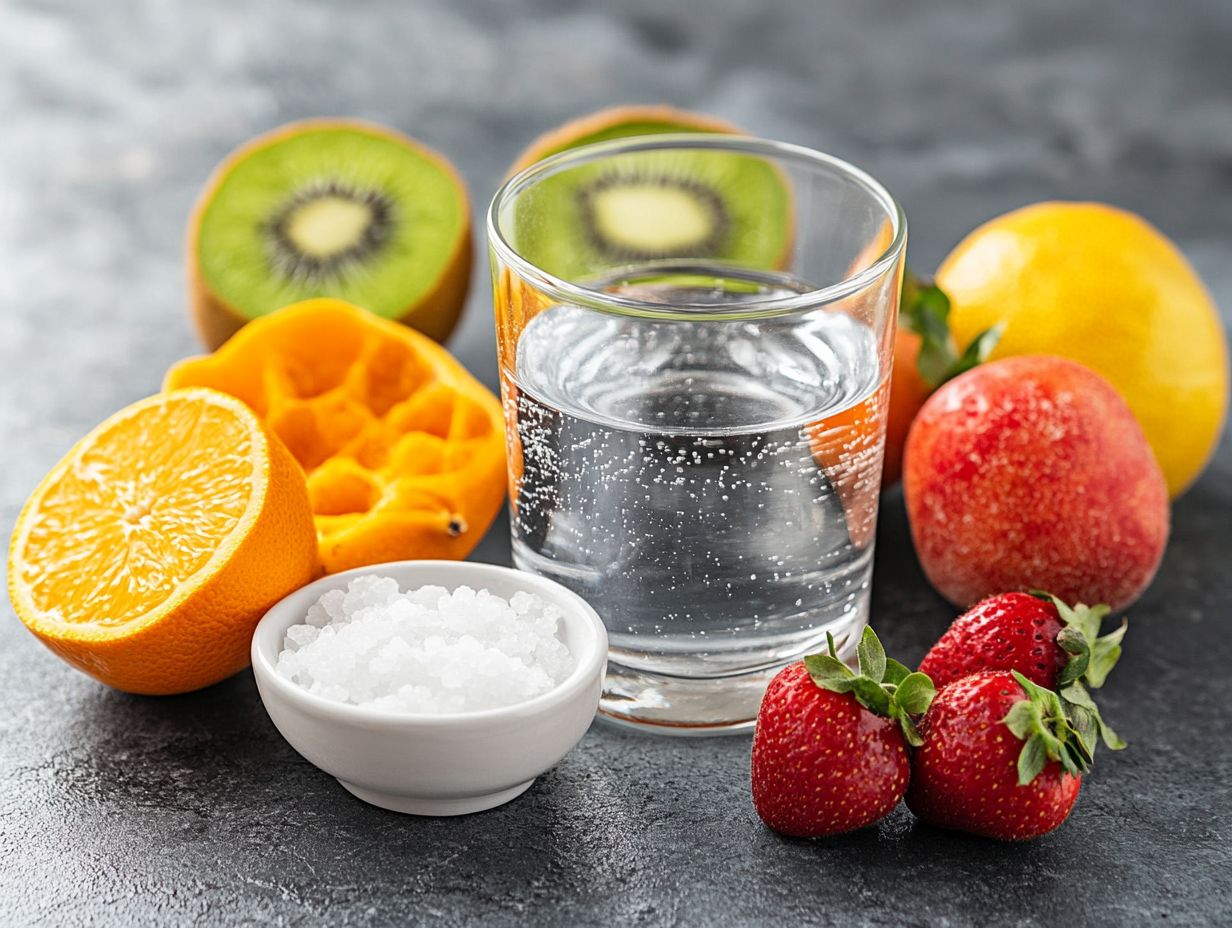
Effective hydration and electrolyte balance hinge on selecting the right dietary sources, being mindful of the hydration index of foods, and integrating electrolyte-rich options into your daily routine.
To achieve optimal results, meal planning becomes essential. This allows you to incorporate a diverse array of fruits and vegetables think bananas, avocados, and spinach each celebrated for their potassium content.
Keeping track of your daily water intake is a wise practice, helping you stay attuned to your hydration levels. You can also explore beverages that enhance electrolyte balance, such as coconut water or electrolyte-infused drinks, for a refreshing twist.
By customizing these strategies to align with your personal preferences and lifestyle factors, you can create a more sustainable approach that meets your unique hydration needs while promoting your overall well-being.
Importance of Electrolyte Replacement During Exercise
Electrolyte replacement during exercise is crucial for maintaining hydration and achieving peak performance. As you engage in physical activity, your body loses essential minerals through sweat.
To replenish these vital nutrients, consider using sports drinks or other electrolyte sources to stay at the top of your game.
Why Electrolytes are Essential for Physical Activity
Electrolytes are essential for your physical activity. They facilitate critical functions such as muscle contraction, nerve signaling, and hydration, making it imperative to replenish these minerals during and after exercise.
Sodium, potassium, calcium, and magnesium play a pivotal role in ensuring your muscles contract efficiently and your nerves transmit signals effectively, which is crucial for maintaining peak performance.
When you engage in prolonged physical activity, your body loses these vital electrolytes through sweat, potentially leading to imbalances that can impair your muscular coordination and response times.
Many athletes turn to electrolyte-enriched drinks or supplements, understanding that restoring these elements not only boosts endurance but also aids in quicker recovery post-exercise.
By prioritizing electrolyte replacement, you can enhance your overall performance and ensure your body is fully prepared for future workouts.
Frequently Asked Questions
What is the Importance of Hydration and Electrolytes?
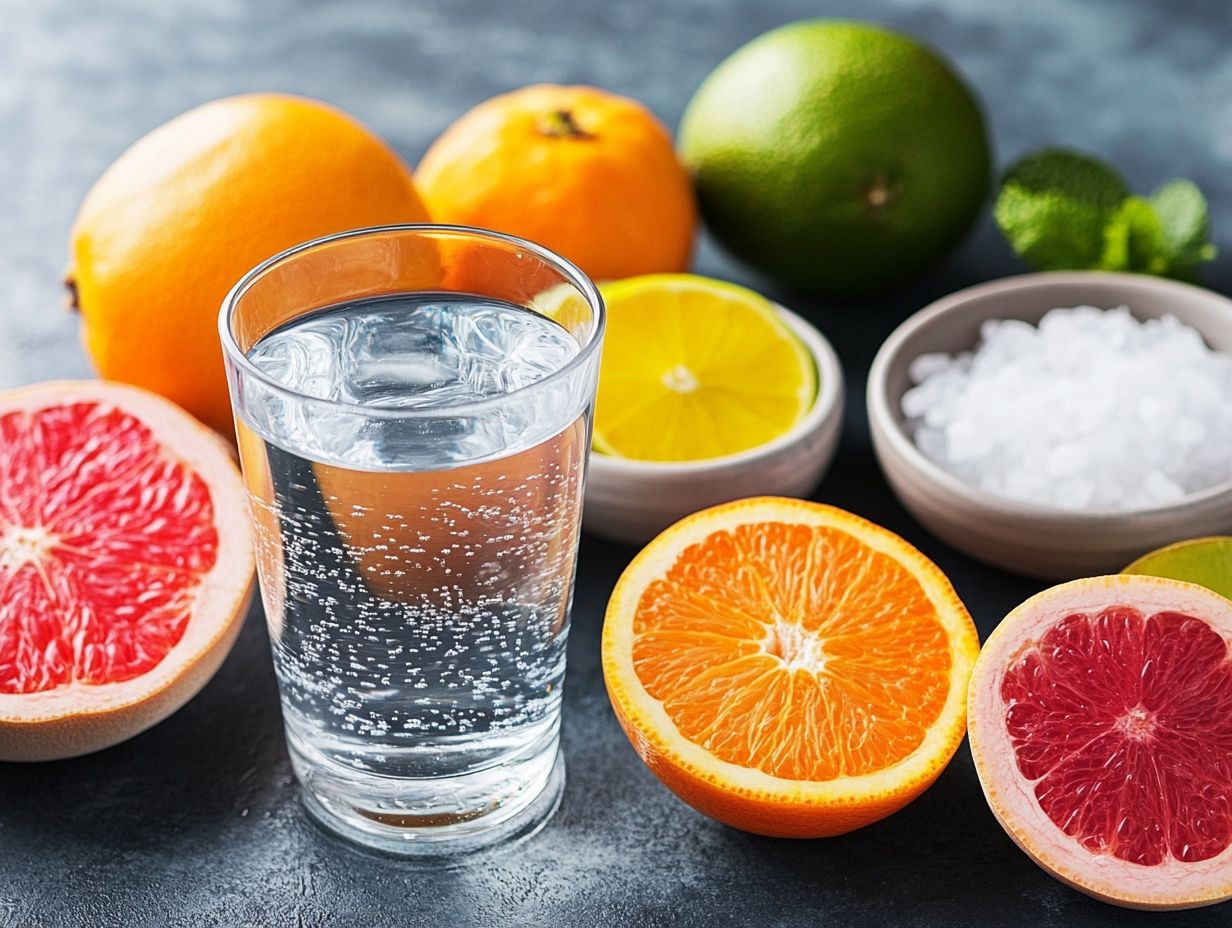
Staying hydrated is crucial for your health. Understanding the importance of hydration in dietary guidelines highlights that hydration and electrolytes are essential for proper bodily functions like regulating temperature and aiding digestion.
They also help carry nutrients and waste throughout the body. Without them, your health can suffer.
How much water should I drink daily to stay hydrated?
The amount of water you need can vary. Generally, aim for at least 8-10 cups (64-80 ounces) daily.
Always listen to your body s thirst cues and adjust your intake based on your needs.
What are electrolytes and why are they important?
Electrolytes are salts and minerals like sodium, potassium, calcium, and magnesium that help our body function. They regulate fluid balance, muscle function, and nerve impulses.
Getting enough electrolytes is key for your overall health.
How does dehydration impact the body?
Dehydration happens when the body loses more water than it takes in. It can lead to fatigue, dizziness, headaches, and muscle cramps.
In severe cases, it can even be life-threatening. Stay vigilant!
How can I ensure I am getting enough electrolytes in my diet?
A well-balanced diet rich in fruits, vegetables, and whole grains provides ample electrolytes. Sports drinks and electrolyte-enhanced water can also help replenish what you lose during exercise.
Can I drink too much water?
Yes, drinking excessive water can lead to a condition called hyponatremia. This occurs when sodium levels in the body become diluted, causing confusion and nausea.
Listen to your thirst cues and avoid forcing yourself to drink more than you need.





